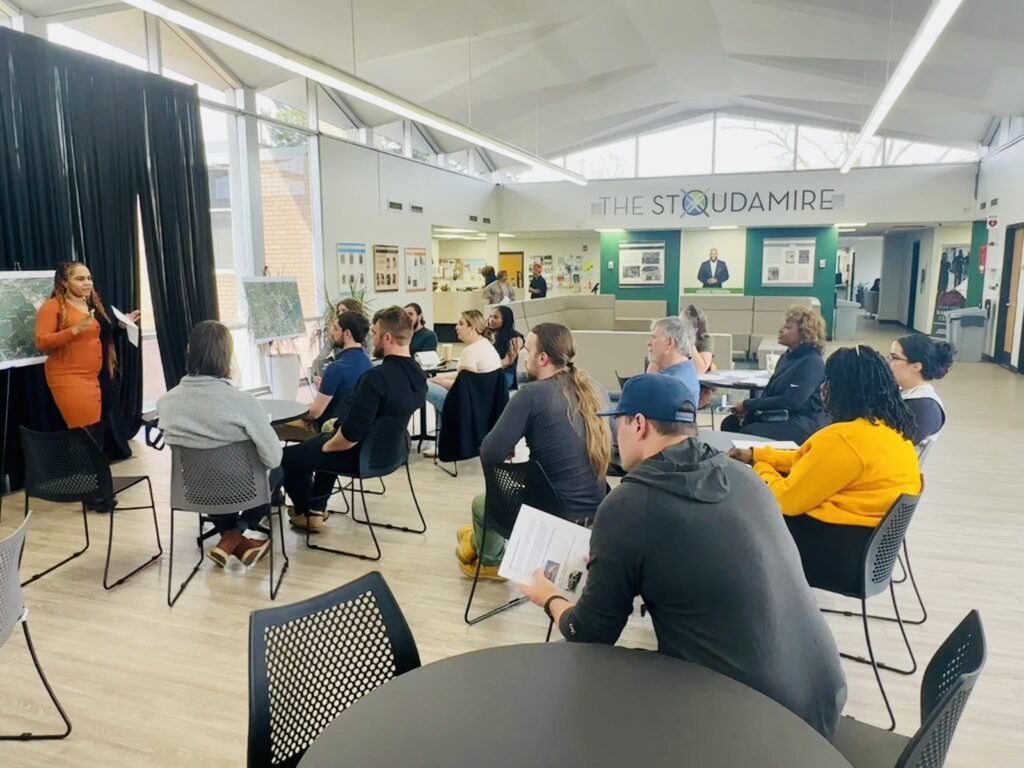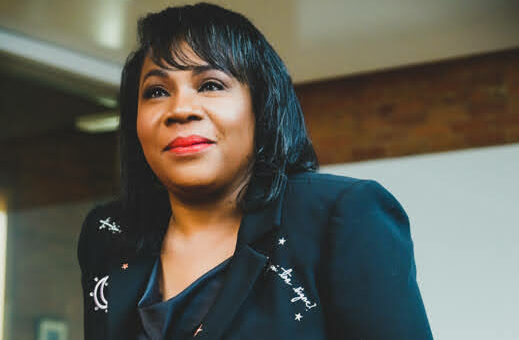Small Businesses Become Resilience Hubs in Eastside Detroit Communities

Elevate is a 24-year-old 501(c)(3) nonprofit focused on creating equitable and sustainable communities. Their areas of focus span energy efficiency, water, workforce development, and creating healthy and efficient homes and buildings in communities. Part of the work it is doing in Detroit is helping to develop resilience hubs in response to flooding and ongoing climate-related injustice issues. This is part of the Resilient Eastside Initiative (REI), a culmination of residents and organizations including the Eastside Community Network (ECN), The City of Detroit Office of Sustainability, and the Eastside Climate Action Coalition. Tim Skrotzki, associate director of partnerships at Elevate, and Terri O’Neal, project manager of community programs, talked with SBN Detroit about this work and the role businesses are playing. Q: What is the impetus behind Elevate? A: Elevate is a Chicago-based nonprofit formed in 2000 as an energy cooperative focused on energy efficiency and reducing the drag on the grid. We have projects that touch almost all states. Over the past twenty-four years, our work has expanded to include water, solar, electrification, environmental health, and workforce development. Q: How is Elevate supporting resilient and sustainable communities throughout Detroit and Southeast Michigan? A: One important initiative is the development of Resilience Hubs on Detroit’s East Side. Resilience hubs are vital community centers offering education, support, and resources while fostering community connections. These hubs – many of which are small businesses in the neighborhoods – serve as trusted spaces in touch with residents’ needs. They help facilitate coordination of resources and services across various stakeholders before, during, and after climate-related emergencies. These are being led by the Eastside Community Network and the Resilient Eastside Initiative (REI), a network of 12 resilience hubs on Detroit’s east side, which officially launched in August 2023 in partnership with The City of Detroit Office of Sustainability with funding from the Kresge Foundation. One of these spaces is The Commons, a café, laundromat, and community space that operates in MACC Development’s storefront space on Mack Avenue. This is a safe space for the community that offers charging stations, resources, and more for neighbors during power outages or emergencies. They are also training and upskilling local residents as a form of workforce development. Neighborhood Grocery is another hub, offering healthy food access, refrigerators, and charging stations to neighbors during power outages. This is a framework a lot of businesses can adopt to provide more resources for their communities. It’s an opportunity for businesses to think about where they fit into the community and how they can help the neighborhood remain resilient and sustainable. Further, part of the funding we received from Kresge is being used for training black contractors in solar and EV infrastructure. Called the Detroit Clean Energy Contractor Accelerator Program, the program helps create growth paths and lift up black and brown contractors to help them build their businesses. We believe that if we develop contractors in clean energy in Detroit they will then hire and train more Detroiters to work with them. Q: What best practices can you share from the sustainability work you do in terms of the business and community impact? A: There are federal incentives for businesses and buildings to become more energy efficient. It’s so easy to track what energy you are using and lower it. There are huge opportunities here that people are leaving on the table. Also, any business looking to grow and be sustainable has to be ingrained in the community. Providing resources that help the neighborhood become more resilient should be on every small business owner’s mind. Q What are trends you are seeing when it comes to the sustainability that impacts businesses? A: We are all dealing with new issues we have not dealt with before. Flooding, power outages from 100-year storms, and more. Making a building more resilient is extremely beneficial to business owners, so they don’t have to reduce hours or close during a flood or power outage. There are new impacts that climate change is driving, and if you are not thinking about how to make your business more resilient you may be losing money. Also, businesses should be and are becoming more involved in community organizations, meetings, and community engagement. It’s thinking about how they can better meet the needs of the community. Perhaps be a place where people can come during power outages and offer resources to support. And finally, all businesses should have a climate emergency plan on the operations side of things for their staff, and if applicable, their community. Be sure to subscribe to our newsletter for regular updates on sustainable business practices in and around Detroit.
Programmatic Grantmaking and Social Investing in Detroit

The Kresge Foundation in Detroit works to collaborate with cross-sector partners to promote and expand long-term, equitable opportunities in Kresge’s hometown through grantmaking and social investing. As such, they are one of the largest funders of environmental work in the city and region. This funding has gone to several of the programs and entities SBN Detroit has covered in our shared content. We spoke with Wendy Lewis Jackson, the managing director for Kresge’s Detroit Program, to get her perspective on the foundation’s impact in the Detroit area and specifically businesses in Southeast Michigan. Jackson leads Kresge’s efforts to revitalize Detroit and strengthen its social and economic fabric. Her work supports organizations providing economic opportunity for low-income people and addresses the needs of vulnerable children and families. Before joining Kresge in 2008, Wendy was a program director for Children and Family Initiatives and executive director for education initiatives at the Grand Rapids Community Foundation. She taught at Grand Valley State University and has co-authored and assisted in the publication of several reports and publications that address community needs and problem-solving. Wendy earned a bachelor’s degree in political science and communications from the University of Michigan. She also holds a master’s degree in social work from U-M, with a concentration in community organization and social policy and planning. Q: The Kresge Foundation was founded in 1924 to promote human progress. How does that mission inform the Kresge Foundation’s work today? A: The mission at that time was very broad, and since that time it’s been refined to include expanding opportunities in America’s cities with an emphasis on supporting families with low income. We now work in cities across the country. Detroit is our hometown and our signature place-based community. We have three other cities of focus and those are Memphis, New Orleans, and Fresno. But we are a national foundation deeply focused on place-based work in hundreds of cities. Q: What are the shifts you’ve seen since started in this role in 2008 and how has the focus changed? A: Our focus shifted starting in 2007 when our president Rip Rapson joined the foundation. Our north star changed from a philanthropy primarily focused on capital challenge grant campaigns for building projects across the country to programmatic grantmaking and social investing designed to ensure that people with low incomes have full access to economic and social opportunity in America’s cities. We now invest deeply in Detroit alongside six discipline-based foundation programs – health, community development, environment, arts and culture, human services, and higher education. Q: What type of work are you doing in Detroit toward your environment focus? A: In Detroit, we work citywide and in neighborhoods to advance economic equity, quality of life, and climate resilience for Detroiters so environmental justice and mitigating the impacts of climate change are a huge part of our portfolio. We support community-based groups and organizations to realize their goals when it comes to climate resilience. We also offer support for advocacy efforts within the state focused on ensuring greater environmental sustainability. Q: What are some examples? A: One of the largest examples involves our work in the Jefferson Chalmers community and the east side of the city. We recently announced the launch of a multimillion-dollar network of solar-powered resilience hubs on Detroit’s east side where residents can go for emergency services and support in times of flooding and other emergencies. The city of Detroit, Eastside Community Network, and Brilliant Detroit will have the first three hubs with more to be added later. We are also working with Jefferson East Inc. and also the University of Michigan Sustainability Clinic on supporting their efforts to address flooding challenges and helping residents to mobilize and advocate for change. Q: What do you think the Kresge Foundation’s impact is on the businesses in Southeast Michigan? A: We hope that through our grantmaking and social investing we begin to raise awareness and possibilities for businesses to get engaged in projects that allow communities better access to improved solar, mobility, and more. One example of this is our partnership with the city of Detroit and DTE on the O’Shea Urban Solar Farm. We don’t want Detroiters to be left behind in the movement toward climate resilience. Businesses in Southeast Michigan are poised to be leaders in the movement to address climate change. So, we are actively seeking opportunities to help businesses ensure that Detroiters have greater access to sustainability technologies and opportunities and make sure community-based groups are able to engage with businesses in these efforts. Q: What are your efforts in sustainability as it pertains to jobs and workforce development in Southeast Michigan? A: I’m glad you brought it up because our efforts are quite significant. A big focus is to make sure Detroiters have access to new and existing jobs in environmental sustainability and climate resilience. We are looking to expand those opportunities now. We supported workforce development efforts through a partnership with the Greening of Detroit. We also recently announced $1.7 million in grant funding for six projects that will benefit communities and wildlife habitats in southeast Michigan. Another example relates to the resilience hubs I mentioned. That project includes a business accelerator to engage Black and Brown contractors in the solar, battery storage, and electric vehicle infrastructure work. Q: What do you think is the role of businesses in Southeast Michigan when it comes to sustainability? A: They have a significant role. As I said, Detroit is in a good position to be a leader in climate resilience. Businesses here are in the process of bringing new and advanced technology toward these efforts and they must ensure all Detroiters have access. It’s critical that businesses are engaged in these efforts. I’d like to share an open invitation to businesses in Southeast Michigan as we are open to partnerships that will ensure Detroit is climate-ready and climate-smart. Q: In terms of this, what are the biggest opportunities? A: We have to look deeply into both the Infrastructure and Jobs


